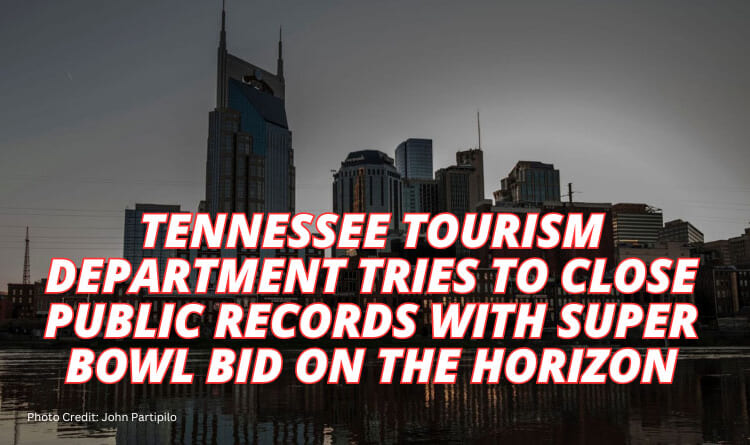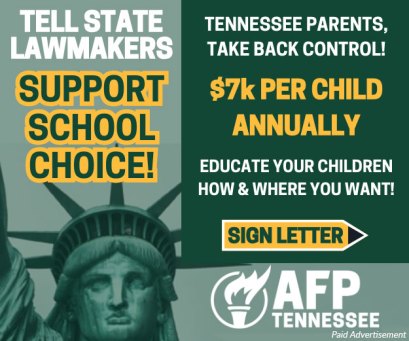A bill under consideration could block the public from finding out the use of taxpayer money to bring the NFL’s top game to Nashville.
Photo: Downtown Nashville, as viewed from the east bank of the Cumberland River. Photo Credit: John Partipilo
By Adam Friedman [Tennessee Lookout -CC BY-NC-ND 4.0] –
Tennessee’s tourism department wants state lawmakers to grant it authority to potentially permanently close off public access to any records it sees as confidential, right as officials are readying a bid to host a future NFL Super Bowl.
“This is exactly what the NFL would want,” said Victor Matheson, a College of Holy Cross sports economist. “The Super Bowl deal is often embarrassing for the NFL because of the demands they make and for the politicians that agree to give the league things like free high-end hotel rooms and police escorts.”
Last year, state and Nashville lawmakers agreed to build the Tennessee Titans a new $2.1 billion stadium, funded with $1.26 billion in taxpayer money.
The new stadium, set to open in 2027, will put the city near the front of the line when the NFL picks cities to host any future Super Bowls. The league has yet to pick a host site for 2028 or after. Expectations are that Nashville will host the game by 2030, meaning they’ll enter into a contract for the project sometime in the next three years.
A contract between the NFL and a Super Bowl host city rarely makes its way into the public view, according to Matheson, adding the only example he could think of was a draft copy for the 2018 game held in Minneapolis, Minn.
The NFL asked the Minneapolis Super Bowl bid committee to cover the cost of presidential hotel suites for league executives, give them 35,000 free parking spaces and police escorts to the game for owners, along with dozens of other requests, according to a 153-page document obtained by the Minneapolis Star Tribune in 2014.
“The league’s favorite phrase in that document was ‘at no cost to the NFL,’” Matheson said.
Tennessee’s tourism department is unlikely to sign a specific contract with the NFL, but its special event fund could contribute money to the Nashville bid committee to cover any request.
Department officials told a House subcommittee they wanted the exemption because it could help when negotiating deals.
Amanda Murphy, a spokesperson for the tourism department, told the Lookout in an email response, that the NFL did not request the department “keep records confidential at this time.”
But, under the new public records exemption the department is pursuing, any future contract or expense could remain hidden from the public for at least five years and potentially forever depending on the length of the contract signed.
Deborah Fisher, executive director of the Tennessee Coalition for Open Government, said it would make sense if the department wanted to keep negotiation information private. But, she added the proposed legislation provides a broad exemption, putting the discretion of confidentiality in the hands of one person: the tourism department’s commissioner.
This public records exemption is similar but more expansive than a controversial one given to the state’s Economic and Community Development Department, allowing it to keep private any information about taxpayer dollars given away as incentives for businesses to locate or expand in Tennessee.
“After agreeing to something, it needs to be publicly available. Otherwise, there is no accountability,” Fisher said. “The public has a right to know what the state is spending its money on.”
What is the special event fund?
Lawmakers created the tourism special event fund in 2022, putting in $25 million to attract a significant “entertainment or sporting event to the state.”
The money appeared in the budget as state GOP leaders pushed Nashville to bid for the 2024 Republican National Convention, and tourism officials pursued hosting a 2026 World Cup game. Nashville failed to attract either event.
The tourism department’s rules require the fund’s money to be spent on “securing major events capable of generating $10,000,000 or more in direct economic impact.”
Only a few dozen events would generate the economic impact necessary to tap the funds, one of which is the Super Bowl.
State House lawmakers will vote on the tourism records exemption legislation during Thursday’s floor session. But the bill is still making its way through the Senate, which has yet to take up the legislation in a committee.



